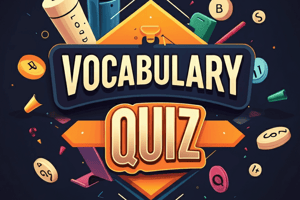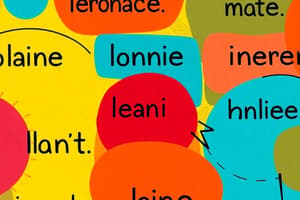Podcast
Questions and Answers
What does the phrase 'I've got to dash' indicate?
What does the phrase 'I've got to dash' indicate?
- I am feeling relaxed.
- I plan to stay longer.
- I need to leave quickly. (correct)
- I want to go for a walk.
When should 'let's get a move on' be used?
When should 'let's get a move on' be used?
- When expressing frustration.
- When encouraging urgent departure. (correct)
- When making a formal request.
- When asking for more time.
What does 'back to back meetings' imply?
What does 'back to back meetings' imply?
- Meetings that are scheduled for later.
- Meetings scheduled closely without breaks. (correct)
- Meetings that overlap in time.
- Meetings with breaks in between.
The phrase 'I'm up to my ears' means what?
The phrase 'I'm up to my ears' means what?
What is the intent behind saying 'give me a minute'?
What is the intent behind saying 'give me a minute'?
What does 'I need to clear my head' suggest?
What does 'I need to clear my head' suggest?
When is 'I could do with a little pick-me-up' typically expressed?
When is 'I could do with a little pick-me-up' typically expressed?
What does 'I'm going to power through' mean?
What does 'I'm going to power through' mean?
What does the phrase 'let's get cracking' mean?
What does the phrase 'let's get cracking' mean?
When is it appropriate to use 'let's get going'?
When is it appropriate to use 'let's get going'?
What is the purpose of the special free tool mentioned in the video?
What is the purpose of the special free tool mentioned in the video?
What additional resource is provided along with the eBook?
What additional resource is provided along with the eBook?
Which phrase should be avoided when discussing serious matters?
Which phrase should be avoided when discussing serious matters?
How is the phrase 'I haven't got a clue' best used?
How is the phrase 'I haven't got a clue' best used?
What is the function of the phrase 'to cut a long story short'?
What is the function of the phrase 'to cut a long story short'?
In what context is 'make up your mind' typically used?
In what context is 'make up your mind' typically used?
What does the speaker mean by 'waffling on'?
What does the speaker mean by 'waffling on'?
How does the speaker describe their own use of vocabulary?
How does the speaker describe their own use of vocabulary?
What is the tone of the video regarding English vocabulary learning?
What is the tone of the video regarding English vocabulary learning?
What is NOT mentioned as a benefit of joining the mailing list?
What is NOT mentioned as a benefit of joining the mailing list?
What does the speaker imply about their storytelling habits?
What does the speaker imply about their storytelling habits?
Which phrase is used to express an inability to find something?
Which phrase is used to express an inability to find something?
What is the suggested learning method when using the video and PDF?
What is the suggested learning method when using the video and PDF?
What does the phrase 'next rounds on me' imply?
What does the phrase 'next rounds on me' imply?
What does the term 'peckish' mean in the context of hunger?
What does the term 'peckish' mean in the context of hunger?
When someone says 'it slipped my mind', what do they mean?
When someone says 'it slipped my mind', what do they mean?
What does 'to make a move' signify?
What does 'to make a move' signify?
Which phrase would you use if you've encountered someone unexpectedly?
Which phrase would you use if you've encountered someone unexpectedly?
What does the expression 'speak of the devil' imply?
What does the expression 'speak of the devil' imply?
How should you respond to 'I don’t think we’ve crossed paths before'?
How should you respond to 'I don’t think we’ve crossed paths before'?
If someone asks 'what floats your boat?', they are inquiring about what?
If someone asks 'what floats your boat?', they are inquiring about what?
What does 'I’ve already taken so much of your time' suggest?
What does 'I’ve already taken so much of your time' suggest?
What is the meaning of 'fill me in'?
What is the meaning of 'fill me in'?
What does 'drop me a line' mean?
What does 'drop me a line' mean?
What does 'to get into something' indicate?
What does 'to get into something' indicate?
Which phrase would imply that you would like to continue a conversation later?
Which phrase would imply that you would like to continue a conversation later?
What is the antonym of the word 'grateful'?
What is the antonym of the word 'grateful'?
Which word is an antonym of 'amazed'?
Which word is an antonym of 'amazed'?
What does the word 'fascinating' mean?
What does the word 'fascinating' mean?
Choose the correct antonym of 'private'.
Choose the correct antonym of 'private'.
Which word can be considered an antonym of 'calm'?
Which word can be considered an antonym of 'calm'?
What does 'unfit' mean in the context of qualifications?
What does 'unfit' mean in the context of qualifications?
Identify the antonym for 'confident'.
Identify the antonym for 'confident'.
Which of the following is the antonym of 'modest'?
Which of the following is the antonym of 'modest'?
What is an antonym for 'optimistic'?
What is an antonym for 'optimistic'?
Which word describes a lack of depth or insight?
Which word describes a lack of depth or insight?
What is the opposite of 'stable'?
What is the opposite of 'stable'?
Identify the antonym for 'reliable'.
Identify the antonym for 'reliable'.
Choose the antonym of 'temporary'.
Choose the antonym of 'temporary'.
What does 'absurd' mean?
What does 'absurd' mean?
Flashcards are hidden until you start studying
Study Notes
Common English Phrases
- "What a shame" is used to express disappointment about a negative or unfortunate event, but not serious events like a death.
- "I haven't got a clue" means you don't know something. It's informal so don't use it with your boss or for important situations.
- "To cut a long story short" is used when you want to summarize a long story and give only the essential information.
- "Make up your mind" means decide. This phrase is used when you want someone to finish making a decision.
- "Mind if I grab the last..." is used to politely ask if you can take the last of something.
- "Got to dash" means you have to leave quickly, often because you are late.
- "Let's get a move on" or "Let's get going" means "Let's go". It's informal and used with friends or family, not with your boss.
- "Let's get cracking" means "Let's start" and is used in informal situations.
Workday Phrases
- "Back-to-back meetings" means having one meeting after another with no break.
- "I'm up to my ears" means you are very busy.
- "I'm going to power through" means you are going to continue working on something until you finish, regardless of any challenge.
- "Give me a minute" means you need a moment to finish something.
- "I need to clear my head" means you need to relax and take a break, often because of stress or feeling confused.
- "I could do with a little pick-me-up" means you would like a treat or snack when you feel tired.
Common English Phrases
- "Could use a little pick-me-up" is used to express a need for a boost of energy.
- "I'm just wrapping up for the day" means finishing work or tasks for the day.
- "Next round's on me" means offering to buy the next set of drinks in a group setting.
- "It's on me" or "This one's on me" means paying for the drinks/food.
- "Dinner's on us" means the speaker and others are paying for dinner.
- "Peckish" means slightly hungry, not wanting a full meal.
- "I could eat" is used to express a small amount of hunger, often jokingly.
- "Fancy a nightcap?" asks if someone wants a drink before bed, typically alcoholic.
- "I'm going to turn in" means going to bed.
- "It slipped my mind" is used to express forgetting something, emphasizing unintentional forgetting.
Meeting Phrases - Familiar Individuals
- "Nice to bump into you" is used when unexpectedly meeting someone familiar.
- "It's great to finally meet you in person" is used when finally meeting someone known through online communication.
- "Speak of the devil!" is said when someone appears just after being mentioned.
- "I've heard so much about you" is used to pay someone a compliment, assuming you have heard good things.
- "I don't think we've crossed paths before" is a polite way to imply you don't know someone, encouraging them to introduce themselves.
Catching Up with Someone Known
- "How is everything going?" is used to start a conversation about someone's life.
- "What have you been up to?" is a friendly way to ask about their activities, implying potential mischief.
- "What have I missed? Fill me in" is used to ask for updates on what happened since the last conversation.
- "We've got so much to catch up on" expresses a desire to talk about things that happened since the last meeting.
- "There's so much to say, but I can't go into it now" indicates a desire to talk more later, implying a lack of time or context.
Getting to Know Someone New
- "How did you get into X?" asks someone how they became involved in a specific field.
- "What do you do for fun?" is used to start a conversation about hobbies and interests, more common in American English.
- "What do you do when you're not working?" is a British English alternative to the previous phrase.
- "What makes you tick?" asks what someone is passionate about or what motivates them.
- "What gets you out of bed in the morning?" is a playful way to ask about someone's motivation.
Keeping in Touch
- "I'd love to carry this on at a later date/another time" expresses a desire to continue a conversation.
- "I feel we've got so much more to talk about" suggests there is more to discuss, encouraging further contact.
- "We should discuss this over lunch/coffee/dinner" implies a desire to continue discussing a topic over a meal or drink.
- "We should do this again" suggests meeting again in the future.
- "Here's my email/number, drop me a line" is a direct way to offer contact information.
Leaving a Conversation
- "I'm a bit pressed for time" is a polite way to indicate a need to leave.
- "Right, I need to make a move" is a casual way to signal leaving.
- "I'm going to have to get going" is a slightly more formal way to say you need to leave.
- "I don't want to hog you, so I'm going to go over here" is a flattering way to leave, implying the other person is in high demand.
- "I've already taken so much of your time" is a polite way to express gratitude for the conversation and signify leaving.
Top 100 English Words
- The top 100 words in English account for roughly 50% of the language.
- The most common nouns include "man," "day," "people," "time," "woman," "life," "world," "thing," "year," "child."
- Pronoun forms include: "he," "her," "him," "I," "it," "me," "my," "our," "she," "them," "that," "these," "they," "this," "us," "we," "who," "you," "your."
- Common verbs include: "come," "find," "give," "get," "go," "have," "listen," "look," "make," "say," "see," "tell," "think," "use," "want."
- Common auxiliary verbs include: "be," "can," "could," "do," "shall," "might," "must," "should," "would," "will."
- Common adjectives include: "all," "any," "different," "even," "first," "just," "last," "white," "many," "more," "new," "one," "some," "two."
- Common adverbs include: "also," "here," "how," "no."
Conjunctions
- Conjunctions connect multiple phrases and sentences.
- They allow for more complex and interesting writing and speaking than without them.
- Common conjunctions include:
- And, or, because, but, if, than, then.
Prepositions
- Prepositions show the relationship between parts of a sentence.
- They show location, direction, time, and other relationships between ideas.
- Common prepositions include:
- About, at, by, for, from, in, into, on, to, with.
Articles
- There are only three articles in English: a, an, and the.
- Articles are used before nouns.
- "A" and "an" are indefinite articles.
- "The" is the definite article.
Antonyms
- Antonyms are words that have opposite meanings.
- Learning antonyms can double vocabulary.
- Examples of antonyms at different English levels (B1, B2, C1) are provided in the lesson.
Phrasal Verbs
- Phrasal verbs are two or more words that act together as a verb.
- They add meaning to the verb and are very common in spoken and written English.
- There are specific phrasal verbs for each situation or action in everyday life.
- Five short stories are used to teach 50 common phrasal verbs in context.
Everyday English Phrases
- Everyday English phrases are common expressions and idioms used in daily speech by native speakers.
- Learning these phrases will make your speech sound more natural and native-like.
- Common expressions and idioms are taught in the context of a story about a birthday surprise.
- Examples include:
- "To get something off the ground"
- "The best idea ever"
- "If I were you, I ..."
- "They were all..."
- "You're in for a treat"
- "I'm not sure about that"
- "Let me have a think"
- "To get the ball rolling"
Studying That Suits You
Use AI to generate personalized quizzes and flashcards to suit your learning preferences.





